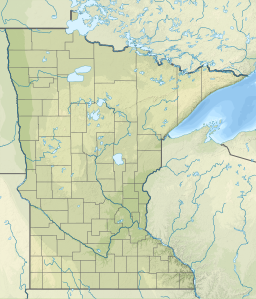Lake Traverse
| Lake Traverse | |
|---|---|
 The continental divide of Lake Traverse | |
| Location | Traverse County, Minnesota / Roberts County, South Dakota, United States |
| Coordinates | 45°46′09″N 96°38′20″W / 45.76917°N 96.63889°W |
| Primary inflows | Mustinka River |
| Primary outflows | Bois de Sioux River |
| Basin countries | United States |
| Surface elevation | 976 ft (297 m) |
Lake Traverse is an 11,200-acre (4,500 ha) lake along the border between the U.S. states of Minnesota and South Dakota, and is the southernmost body of water in the Hudson Bay watershed of North America. Lake Traverse is drained at its north end by the northward-flowing Bois de Sioux River, a tributary of the Red River of the North. A U.S. Army Corps of Engineers dam at the outflow regulates the lake's level. The Mustinka River flows into the lake just above the dam.
Lake Traverse Indian Reservation of the Santee Dakota lies on the west shore of the lake.
The Traverse Gap, a low continental divide and part of the Laurentian Divide, separates the south end of Lake Traverse from Big Stone Lake. Big Stone Lake is the headwaters of the south-flowing Minnesota River, part of the Mississippi River System. Prehistorically, the south end of Lake Traverse was the southern outlet of glacial Lake Agassiz across the Traverse Gap into Glacial River Warren; that river carved the valley now occupied by the present-day Minnesota River. The town of Browns Valley, Minnesota lies within the gap between the two lakes.
The Browns Valley Dike was constructed in 1941 at the south end of Lake Traverse to prevent flooding south into Big Stone Lake and the Mississippi watershed. However, the Little Minnesota River, which flows into Big Stone Lake, passes within 2,000 feet (610 m) of Lake Traverse. In case of flooding of the Little Minnesota River, its waters can pass through culverts within the dike, and across the divide into Lake Traverse. This prevents flooding of homes in the Browns Valley area.[1]
Lake Traverse is an Anglicization of Lac Traverse, a French name meaning "across the lake".[2]
See also
External links
References
- ^ "BROWNS VALLEY DIKE - HISTORY AND POTENTIAL FOR INTERBASIN FLOW" (PDF). July 1999. Archived from the original (PDF) on 2004-02-21.
- ^ Gannett, Henry (1905). The Origin of Certain Place Names in the United States. Government Printing Office. pp. 178.



